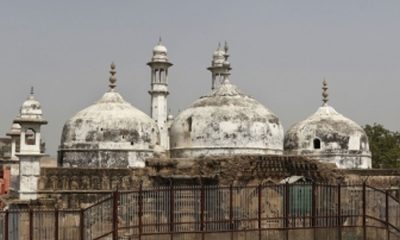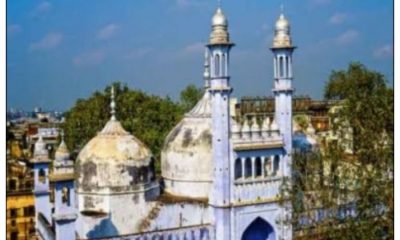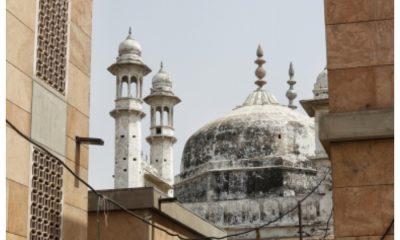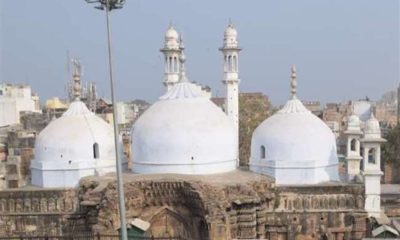Politics
Srirangapatna’s is becoming Gyanvapi of Karnataka

As the controversy surrounding the Gyanvapi mosque in Varanasi continues, Hindu activists in Karnataka are all set to take a legal recourse on surveying and inspecting the Jamia Masjid, located in the historical town of Srirangapatna in Mandya district.
Aswathi.S., District Commissioner (DC) of Mandya, has already received a petition by the activists to carry out an inspection to verify if the Jamia Masjid was built on the ruins of a Hanuman temple.
“The DC has informed us that she has already sent out a request to the government. If the government does not respond, we are ready to approach the court,” C.T. Manjunath, state secretary of the Narendra Modi Vichar Manch, told IANS, adding that legal action will be pursued in coordination with Hindu organizations.
Jamia Masjid, built by the erstwhile ruler of Mysuru Tipu Sultan, has come in the eye of the storm as Hindu organisations have announced the congregation of 6 lakh maladhaari devotees of Lord Hanuman in Srirangapatna during the upcoming Hanuman Jayanti, raising law and order concerns.
The organisations have also sought a nod from authorities to conduct prayers in the mosque.
The mosque authorities have already made several appeals to the authorities to protect the shrine from Hindu activists.
Jamia Masjid also called as Masjid-i-Ala, is located inside the Srirangapatna fort. Built in 1786-87, the mosque has three inscriptions that mentions nine names of the Prophet Muhammad.
The mosque has two minarets and is built over an elevated platform. There are galleried balconies that separate each stage of the minaret. The mosque is two-storied and unlike other mosques, it does not have a dome.
The Jamia Masjid is administered by the Bengaluru Circle of the Archaeological Survey of India (ASI).
Meanwhile, C.T. Manjunath explains that they strongly believe with evidence that the Jamia Masjid was built after razing down a Hanuman temple.
“B. Lewis Rice, a British historian, archaeologist and educationist in his report to the ASI mentions about Hanuman temple on Page number 61 in 1935,” he told IANS.
“Apart from this, Malabar Manual, Mysore Gazetteer by Lewis Rice, Tareeq-e-Tipu, Haider-e-Nishani also give enough proof of razing down of temples by Tipu Sultan. The sword of Tipu Sultan has an inscription on it which reads that it will go against those who do not follow Islam.
“It is not intolerant to ask for our temple. There are 7 lakh active mosques in the country. If Hindus were to be intolerant, this would not have been possible. Even Muslim nations do not have such a great number of mosques,” he adds.
Manjunath says that there is a board put up by the ASI which bans any activity in the mosque, but Tablighis arrive here every year for training.
“The idol if Goddess Annapoorneshwari is not found now. The idols and footprints of Hindu idols, religious symbols are chiseled out. The issue has been raised already,” he explains.
Hindu activists maintain that there are emblems of the erstwhile Hoysala kingdom inside the mosque. There is ‘Kalyani’ (traditional Hindu water body built inside temple premises) inside the mosque. Every pillar also has the emblem of ‘Gandubherunda’ (two-headed bird in Hindu mythology) and ‘Simha’ (lion).
Hindu activists believe that Hanuman temples are built in eight directions of the historical Sri Ranganatha Swamy Temple in Srirangapatna town. The Jamia Masjid was also one among them.
Nanje Gowda, a senior journalist working for a reputed Kannada daily, countered the view and told IANS: “The famous, most sacred and ancient 9th century Sri Ranganatha Temple in Srirangapatna town which is located within 200 metres of Tipu Palace Lotus Mahal is intact. It has not been disturbed by either Tipu Sultan or his father Hyder Ali. In fact the temple premises have Hyder ‘mantapa’ (platform). Hyder Ali has generously contributed to the temple.”
Gowda fears that this would become a major issue in the region. “After hijab crisis, saffron shawls have reached almost all Hindu students. Anything can happen in the coming days,” he said.
Rishi Kumar Swamiji of Kali Mutt was arrested in January on charges of giving a call to demolish the Jamia Masjid.
He had demanded for it to be closed until it was decided whether it is a temple or a mosque.
“Even a Hindu child will get provoked after seeing the pillars, platforms for Nag devtas. I am a sage. How should I feel? I naturally felt pained on seeing what had happened to my temple. I have faith in law. Through this law, the Ram Mandir is being in Ayodhya in Uttar Pradesh. I will get justice in the case,” Rishi Kumar Swamiji said.
“For Babri Masjid, the authorities have to dig land beneath the mosque and find proof. But, in this case the authorities in Srirangapatna city will just have to get documents of the mosque.”
The historical Srirangapatna is regarded as Karnataka’s Ayodhya by Hindu activists.
Sources say that with Hindu activists taking up the issue, the party is going to reap rich electoral success in the region which is presently considered as the bastion of regional party JD (S).
Srirangapatna town is located in Mandya district, considered as the heartland of the dominant Vokkaliga community. With Opposition leader Siddaramaiah, State Congress President D.K. Shivakumar pitching in against Hindutva ideology, experts say, it won’t be easy for BJP to reap political benefits here.
It also remains to be seen how the situation unfolds in the town, which will have a direct impact on capital Bengaluru.
National News
SC issues notice on plea to frame guidelines over ‘menstruation checks’
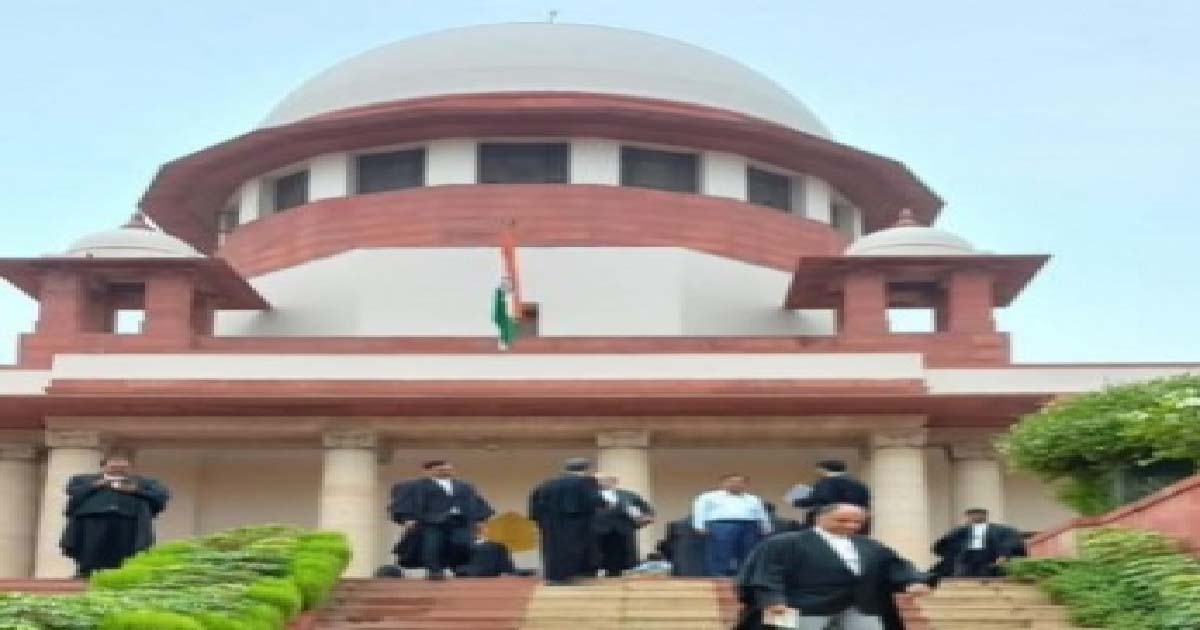
SUPRIM COURT
New Delhi, Nov 28: The Supreme Court on Friday sought responses from the Centre and the Haryana government on a petition highlighting the alleged humiliation of three female sanitation workers at Maharshi Dayanand University (MDU) in Rohtak, who were reportedly forced to furnish photographic proof of menstruation to their supervisors.
A bench of Justices B.V. Nagarathna and R. Mahadevan issued notice on the writ petition filed by the Supreme Court Bar Association (SCBA) under Article 32 of the Constitution.
The matter, now scheduled for hearing on December 15, raises concerns about protecting women’s rights to health, dignity, privacy, and bodily autonomy in workplaces and educational institutions during menstruation or related gynaecological issues.
The plea stems from an incident reported on October 26, when the three sanitation workers — called in on a Sunday due to the visit of the Haryana Governor — were allegedly “verbally abused, humiliated and pressured” by supervisors hired through the Haryana Kaushal Rozgar Nigam Limited.
According to the petition, the supervisors “demanded photographic proof from the workers by asking them to send photos of their sanitary pads”.
During the hearing, Justice Nagarathna-led Bench remarked that the episode reflected “a mindset” that was deeply troubling.
“In Karnataka, they are giving period leave. After reading this, I thought — will they ask for proof for giving the leave?” observed Justice Nagarathna.
“This shows the mentality of the person. If some heavy work could not be done because of their absence, somebody else could have been deployed,” the apex court added, expressing hope that “something good will happen in this petition”.
Following the incident, the MDU had suspended the two supervisors and initiated an internal inquiry. The Haryana State Commission for Women also took suo motu cognisance and sought reports from the varsity administration and the Rohtak police.
The Assistant Registrar and the two supervisors were subsequently booked under various provisions of the Bharatiya Nyaya Sanhita relating to assault and outraging the modesty of a woman.
Calling the episode “disturbing”, the SCBA in its petition said such acts amounted to a violation of the women’s fundamental right to life, dignity, privacy and bodily integrity under Article 21.
The plea also referred to similar instances of “period-shaming” and invasive checks in schools and workplaces over the years, including a 2017 case where 70 girls in Uttar Pradesh were allegedly stripped naked to check for menstrual blood, and a 2020 incident in Gujarat where 68 college students were asked to remove their underwear for inspection.
Filed through advocate Pragya Baghel, the petition has sought directions to the Centre and the Haryana government to conduct a detailed inquiry into the Rohtak incident and issue nationwide guidelines “to ensure that the right to health, dignity, bodily autonomy and privacy of women and girls is not violated when they are going through menstruation and related gynaecological issues at workplaces and educational institutions”.
National News
SC restrains Maharashtra SEC from exceeding 50 pc reservation in local body polls

SUPRIM COURT
New Delhi, Nov 28: The Supreme Court on Friday restrained the Maharashtra State Election Commission (SEC) from notifying reservations beyond 50 per cent in local bodies where elections are yet to be announced.
While allowing the already-notified polls to proceed as scheduled, a Bench of Chief Justice of India (CJI) Surya Kant and Justice Joymalya Bagchi said that the results in local bodies where the quota exceeds the 50 per cent ceiling will remain subject to the outcome of the petitions challenging OBC reservation in Maharashtra.
“The elections of municipal councils and nagar panchayats may take place as per the notified schedule. However, the results of local bodies where reservation exceeds 50 per cent will be subject to the result of the writ petition,” the CJI Surya Kant-led Bench ordered.
Directing the SEC to notify elections to zila parishads, municipal corporations, and panchayat samitis, the apex court added: “So far as other bodies, the state government and the SEC will be at liberty to initiate the election process. However, it is directed that reservation in all these institutions shall not exceed 50 per cent. This condition is also subject to the final outcome of the present proceedings.”
The bench referred the matter to a three-judge Bench and posted it for hearing on January 21.
After senior advocate Vikas Singh urged the court to issue a positive direction to ensure elections are not stalled further, the Bench ordered: “In Zila Parishads and Panchayat Samitis, wherever reservation does not exceed 50 per cent, let the elections be held in terms of the previous directions.”
Senior advocate Balbir Singh, appearing for the SEC, informed the top court that elections to 246 municipal councils and 42 nagar panchayats have already been notified for December 2, and that in 57 local bodies going to polls, the reservation limit of 50 per cent has been crossed.
In May this year, the Supreme Court had directed that local body elections be completed within four months, with OBC reservation restored in accordance with the pre-2022 J.K. Banthia Commission legal framework. It clarified that the polls shall be subject to the outcome of the petitions challenging the recommendations of the Banthia commission.
In a subsequent hearing held on September 16, the apex court pulled up the state authorities for failing to comply with its earlier direction to complete the election process by August this year, and again ordered the SEC to conduct local body polls in the state by January 31, 2026.
The apex court directed that the delimitation exercise be completed by October 31, adding that any delay in delimitation will not be a ground to defer the local body elections.
National News
J&K Police & CRPF carry out searches in Srinagar’s Lal Chowk
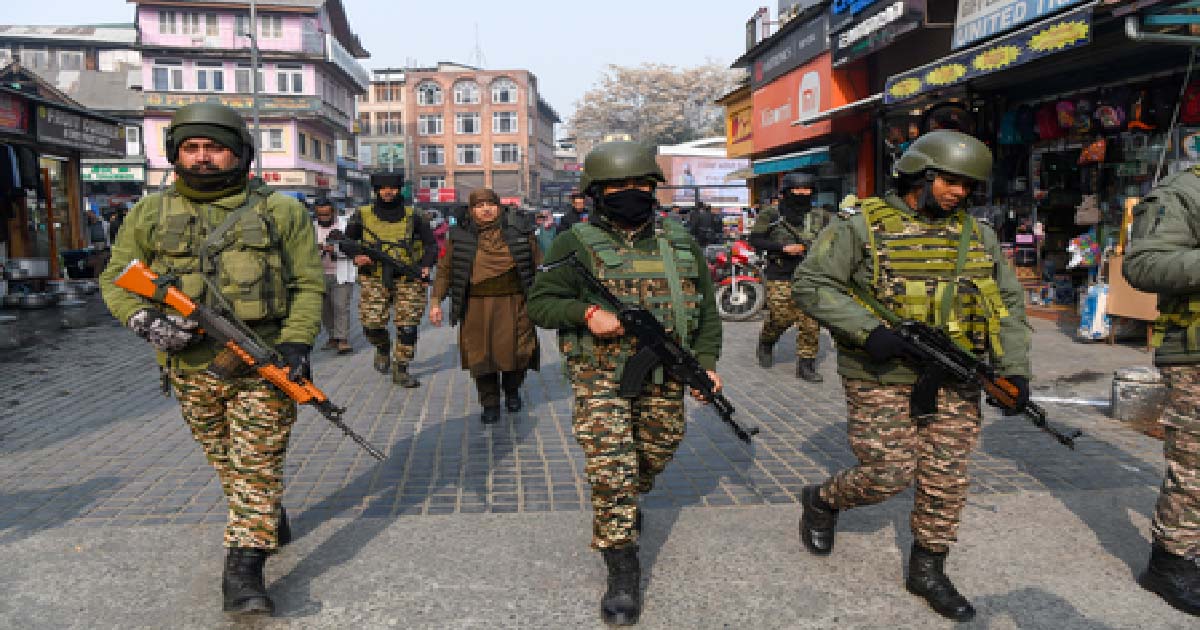
Srinagar, Nov 28: J&K Police and the Central Reserve Police Force (CRPF) carried out a cordon and search operation (CASO) in Srinagar’s Lal Chowk on Friday.
“The search operation was carried out as part of heightened security measures in the busy commercial centre,” an official said.
“Multiple teams conducted surprise inspections in several hotels and guest houses to verify records of visitors and ensure overall security compliance,” the official said, adding: “The operation continued for several hours; however, no suspicious activity was reported.”
J&K Police and other security forces have been carrying out aggressive anti-terrorist operations across the UT. These operations are focused on terrorists, their overground workers (OGWs), sympathisers, drug smugglers, and those involved in hawala money rackets and other unlawful financial activities.
This is part of the revised strategy by the security forces to dismantle the support system of terror rather than just focusing on the gun-wielding terrorists.
J&K has a 740-km-long line of control (LoC) and a 240-km-long international border (IB).
The army guards the LoC situated in Baramulla, Kupwara and Bandipora districts of the Kashmir Valley and Poonch, Rajouri, and parts of the Jammu district of the Jammu division.
The Border Security Force (BSF) guards the IB situated in Jammu, Samba, and Kathua districts of Jammu division.
The army and the BSF guard against infiltration, cross-border smuggling, and terrorist drone activity on the LoC and the IB, while the J&K Police and other security forces carry out anti-terrorist operations in the hinterland.
In the recent security review meeting, which was attended by senior officers of the army, paramilitary forces, J&K police, intelligence and senior civil administration officers, Lt Governore Manoj Sinha gave clear instructions to the security forces to target the support system of terrorism in the UT.
-

 Crime3 years ago
Crime3 years agoClass 10 student jumps to death in Jaipur
-

 Maharashtra1 year ago
Maharashtra1 year agoMumbai Local Train Update: Central Railway’s New Timetable Comes Into Effect; Check Full List Of Revised Timings & Stations
-

 Maharashtra1 year ago
Maharashtra1 year agoMumbai To Go Toll-Free Tonight! Maharashtra Govt Announces Complete Toll Waiver For Light Motor Vehicles At All 5 Entry Points Of City
-

 Maharashtra1 year ago
Maharashtra1 year agoFalse photo of Imtiaz Jaleel’s rally, exposing the fooling conspiracy
-

 National News1 year ago
National News1 year agoMinistry of Railways rolls out Special Drive 4.0 with focus on digitisation, cleanliness, inclusiveness and grievance redressal
-

 Maharashtra1 year ago
Maharashtra1 year agoMaharashtra Elections 2024: Mumbai Metro & BEST Services Extended Till Midnight On Voting Day
-

 National News1 year ago
National News1 year agoJ&K: 4 Jawans Killed, 28 Injured After Bus Carrying BSF Personnel For Poll Duty Falls Into Gorge In Budgam; Terrifying Visuals Surface
-

 Crime1 year ago
Crime1 year agoBaba Siddique Murder: Mumbai Police Unable To Get Lawrence Bishnoi Custody Due To Home Ministry Order, Says Report



